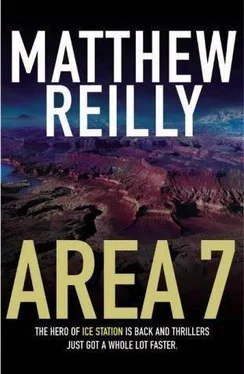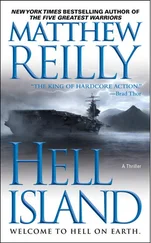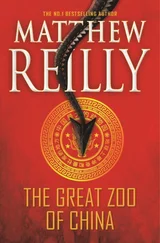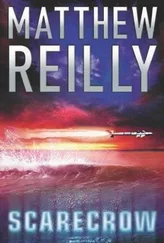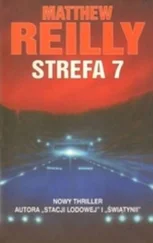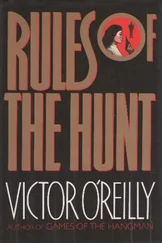Matthew Reilly - Area 7
Здесь есть возможность читать онлайн «Matthew Reilly - Area 7» весь текст электронной книги совершенно бесплатно (целиком полную версию без сокращений). В некоторых случаях можно слушать аудио, скачать через торрент в формате fb2 и присутствует краткое содержание. Жанр: Старинная литература, на английском языке. Описание произведения, (предисловие) а так же отзывы посетителей доступны на портале библиотеки ЛибКат.
- Название:Area 7
- Автор:
- Жанр:
- Год:неизвестен
- ISBN:нет данных
- Рейтинг книги:5 / 5. Голосов: 1
-
Избранное:Добавить в избранное
- Отзывы:
-
Ваша оценка:
- 100
- 1
- 2
- 3
- 4
- 5
Area 7: краткое содержание, описание и аннотация
Предлагаем к чтению аннотацию, описание, краткое содержание или предисловие (зависит от того, что написал сам автор книги «Area 7»). Если вы не нашли необходимую информацию о книге — напишите в комментариях, мы постараемся отыскать её.
Area 7 — читать онлайн бесплатно полную книгу (весь текст) целиком
Ниже представлен текст книги, разбитый по страницам. Система сохранения места последней прочитанной страницы, позволяет с удобством читать онлайн бесплатно книгу «Area 7», без необходимости каждый раз заново искать на чём Вы остановились. Поставьте закладку, и сможете в любой момент перейти на страницу, на которой закончили чтение.
Интервал:
Закладка:
keeps aliens and crashed alien spacecraft. The second reason
was far more pragmatic: a blazing hot desert was the diametric
opposite to the Antarctic wasteland of Ice Station and
I figured that, visually, a sequel to Ice Station should be as
different as possible to the original. And once I learned
about the extraordinary landscape of Lake Powell, with its
incongruous mix of towering canyons and watery lakes and canals, the choice of location was settled. (And, hey, I'd
been to the cold for Ice Station, the jungle for Temple, and
the city for Contest, so why not tackle a desert environment
for my fourth book?)
Have you been to Lake Powell?
Yes, I have. As part of my research for Area 7, I went to the
Utah-Arizona border just to see the lake. I'd seen pictures of
it in books (and on the Internet), but decided I had to see it
for myself. It is absolutely awesome. Oddly, though, when
you meet Americans and ask them, "Have you been to Lake
Powell?" they say, "Lake what?" Granted, it is very close to
the Grand Canyon, so it's probably just overshadowed by its
more famous neighbor.
Some questions about technique. How do you go about
writing? For example, do you set yourself certain hours in
which to work each day, or are you a "have to be in the mood" kind of writer?
I am, without question, a "have to be in the mood" kind of
writer. The simple reason for this is that I have tried writing
488
Matthew Reilly
when I wasn't in the mood, and I didn't like what I wrote. I
had wasted my time. Now, if I'm not in the mood, I go to the
library and do some research or see a movie (often just to
give my mind a rest), and when I return, I am usually ready
and raring to go.
The more complex reason, however, for this method of
writing is that I just can't stand routine. I love variation, in
the hours I work, in the amount of writing I do, in how I
spend my day. (I also, it must be said, have a pathetically
short attention span!) So rather than look at writing on a
day-to-day basis--and say to myself, "Okay, Matt, you have to write for six hours today between the hours of 9 a.m. and
3 p.m."--I look at my writing on a weekly basis and say: "All right, this week, I would like to get four good days'
worth of writing done. Doesn't matter when I do it, as long
as it gets done." Now, I don't care if I get that writing done
during the day, the evening, or the middle of the night
(which can be a very good time to write since the phone--
usually--doesn't ring at two o'clock in the morning!). So
long as I get it done, I am happy. Working this way, on the
average day, I get about eight hours of writing done.
Sounds like this would require considerable self-motivation.
How do you motivate yourself to keep writing?
Generally speaking, motivation isn't a problem for me. Like
everyone else, I have my bad days (who doesn't?), but
they're not very common. Quite simply, I enjoy the act of
writing. I am not a stereotypical "tortured" writer, hunched
over my keyboard, tearing my hair out, gnashing my teeth at
the prospect of the next sentence. I like writing. I like creating.
And I love creating big action scenes with words on a
page. Since that's pretty much what I do each day, I find motivating
myself fairly easy. Now, motivating myself to exercise,
that's another story ...
Having said that, however, I should say something a little
more general on the subject (because I am asked about
Area 7 489
motivation a lot). Writing a book does take a lot of self-motivation. It takes me about a year to write each novel. That's
a long time to spend on a single project, so you have to really
love what you're doing--and that means wanting to tell
the story you're telling.
If you have a story to tell, no one will force you to
write it down. You have to do it. If you don't know the ending,
no one else is going to give it to you. You have to figure
it out. Writing a book--to me--is one of the most invigorating
mental challenges in the world. It can be hard (when I
was finishing the writing of Temple, my head was nearly exploding
with all the subplots running between the two parallel
stories); it can be thrilling (it took me nearly two weeks to write the hovercraft chase in Ice Station, but every one of those days was just awesome; typing fast, living the action in my head); and it can be painful (I cut a killer action scene from Temple--before I actually wrote it, thank God--because I felt it was one too many) but when you see that manuscript sitting on your desk at the end of it all, it is enormously--enormously--satisfying.
On a more defatted note, when you write, do you work on a
chapter-by-chapter basis?
No. I work on a scene-by-scene basis. I like to think that
with my books, chapter endings are generally not the best
place to stop reading. And, indeed, this is how I write--I
don't stop writing when I reach the end of a chapter. I keep
going, as I hope the reader will do. I stop my day's writing
when I get the scene done. Again, the hovercraft chase in Ice
Station is a good example. That forty-page action sequence
took me nearly two weeks to write (sounds like making a
movie, doesn't it?), but in it are a whole bunch of small interwoven
mini-scenes--Schofield going under the hovercraft;
Book Sr. saving Holly; Renshaw and Schofield
running alongside the cliff edge. I did each of these mini
scenes on a different day.
490 Matthew Reilly
Any other tips for aspiring writers?
Yes. There is no such thing as an "aspiring writer." You are a
writer. Period. I was told that once, and I have never forgotten
it.
So what's next for Matthew Reilly?
Hmmmm. Good question. With my next book, I want to
reinvent what I do, and take the action thriller to the next
level. It can go faster. I'm talking lean, mean and totally out
of control. In the downtime I've had since finishing Area 7,
I have been working on this idea, toying with new structures,
figuring out ways to make the narrative just zoom along. I
think if you want longevity as a creative individual (think of
Madonna, or U2, or of great storytellers like Steven Spielberg,
Michael Crichton, or Joss Whedon) you have to evolve, constantly reinvent yourself, and take your craft to a
new level. Reset the benchmark for yourself. So, to answer
the question: the future involves pushing myself to a new
level of speed in my next novel. And then I'm going to make
a movie.
Any final comments ?
As always, I just hope you enjoyed the book. Best wishes,
and hopefully, I'll see you next time!
Matthew Reilly
Sydney, Australia
August 2001
Read on for an excerpt from
Matthew Reilly's next book
CONTEST
Coming in hardcover
March 2003
From St. Martin's Press
THE SWITCHBOARD OPERATOR STARED AT THE PANEL BEFORE
her in stunned disbelief.
When is this going to stop? she thought.
On the panel in front of her, two rows of flashing lights
indicated that there were a hell of a lot of phone calls waiting
to be answered.
She took a deep breath and pressed the flashing square
that read "9," and began:
"Good evening, Con Edison Customer Service Line,
my name is Sandy. How may I help you?"
Her headset rattled with the tinny voice of yet another
disgruntled New Yorker. When finally it stopped, she
punched the code--401--into her computer console.
Читать дальшеИнтервал:
Закладка:
Похожие книги на «Area 7»
Представляем Вашему вниманию похожие книги на «Area 7» списком для выбора. Мы отобрали схожую по названию и смыслу литературу в надежде предоставить читателям больше вариантов отыскать новые, интересные, ещё непрочитанные произведения.
Обсуждение, отзывы о книге «Area 7» и просто собственные мнения читателей. Оставьте ваши комментарии, напишите, что Вы думаете о произведении, его смысле или главных героях. Укажите что конкретно понравилось, а что нет, и почему Вы так считаете.
